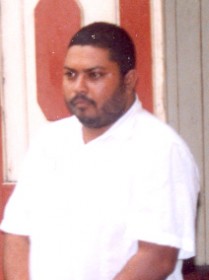According to one of his lawyers Glen Hanoman, two van loads of policemen picked up the businessman near his home on Friday night.
After staying overnight in custody, Dataram was released on his own recognizance around 6 pm yesterday, Hanoman said, adding that police have given no reason for his detention.

Several attempts to reach senior police officials on this matter yesterday were futile but according to Puran, when questioned, the police would only say that they were acting on “instructions from higher up”. He said that he has no details on why his client was arrested.
The attorney pointed out that his client had become “accustomed to things of this nature”.
Dataram has been arrested five times since 2007 on provisional warrants for the purpose of extraditing him to US where he is wanted for alleged cocaine smuggling. None of the cases brought by local police were ever successful. He was last arrested earlier this year.
It all started for Dataram when his wife and then three-year-old daughter were kidnapped by two Venezuelans in December 2007. One of the Venezuelans was subsequently shot dead in a confrontation with the police. The kidnapping was reportedly drug-related and it was shortly after these events that Dataram was first taken into police custody.
Dataram was detained beyond the 72 hours that the law allows a person to be held in custody before being charged.
His lawyers subsequently approached the court with a habeas corpus writ but police asked for an extension to conclude their investigation into the kidnapping, which they said was drug-related.
What followed was a series of court appearances during which Dataram was twice set free and rearrested.
He was finally set free in December, 2008. After Dataram was released, the state filed an appeal against the High Court ruling, which had exposed a flaw in the extradition law.
Subsequently, government announced that it would modify the law, and in October last year it passed an amendment to the Fugitive Offenders Act 1988 to address the conflict that arose within the law regarding individuals here being extradited. The amendment also controversially included a provision which empowers the Home Affairs Minister to decide whether to extradite or not.
Dataram was rearrested in February, released and then rearrested. The then Acting Chief Magistrate Melissa Robertson had refused to grant an arrest warrant for Dataram, as she had not received a request from the US government for his extradition.
His lawyers subsequently moved to the High Court and an hour before the hearing Dataram was released on $100,000 station bail.




